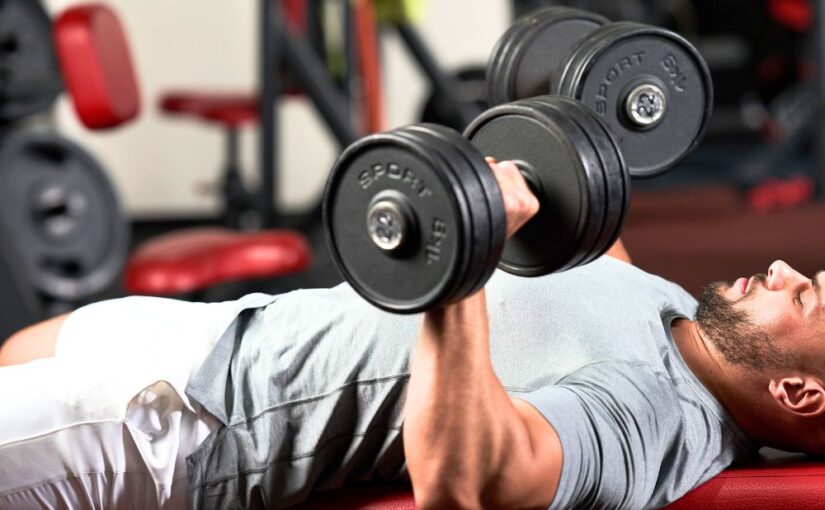The dumbbell vs barbell debate is one of the most discussed topics in strength training, especially when it comes to bench pressing. Both tools are highly effective for developing upper body strength and size, but they differ in how they activate muscles, load the body, and impact joint health.
Choosing between the dumbbell bench press and the barbell bench press depends on your training goals, fitness level, and personal preferences. In this guide, we’ll explore the benefits of each, compare them head-to-head, and help you decide which variation is best for your bench press routine.
Dumbbell Bench Press Benefits
Greater Range of Motion with Dumbbells
The dumbbell bench press allows your arms to move through a deeper range of motion compared to a barbell. This extended movement stretches the pectoral muscles more fully, promoting greater muscle activation and development. For those aiming to build a bigger chest, this makes dumbbells an excellent tool.
In fact, studies have shown that exercises with a wider range of motion, like the dumbbell press, can activate more muscle fibers. This leads to better overall muscle growth, particularly in the chest. When performing a dumbbell bench press, the shoulder joint can move more freely, helping to stretch and contract the chest muscles more fully. This can be beneficial for individuals focusing on hypertrophy (muscle size) and wanting to maximize muscle fiber recruitment.
Dumbbell Press for Muscle Balance and Stability
Because each arm works independently during the dumbbell bench press, you’re forced to stabilize each side of the body equally. This helps correct muscle imbalances and strengthens stabilizing muscles that often go underused during barbell lifts. The result is a more balanced and functional upper body.
For instance, if one arm is naturally stronger than the other, dumbbells provide an opportunity to bring the weaker side up to speed. This can be particularly helpful for athletes or individuals with past injuries who need to rehabilitate or strengthen their weaker muscles.
Dumbbell Press and Joint-Friendly Motion
Dumbbells give your wrists, elbows, and shoulders the freedom to move in a more natural and comfortable path. Unlike a fixed bar path, dumbbells reduce joint stress by accommodating your individual mobility. For those with shoulder pain or joint sensitivity, dumbbells often provide a safer alternative to barbell pressing.
This makes dumbbells a great option for individuals who might be recovering from an injury or those who prefer a more natural range of motion. In contrast, the rigid structure of the barbell can sometimes exacerbate joint pain, especially if the lifter’s technique is off or they’re using too much weight.
Barbell Bench Press Benefits
Barbell Press for Maximum Load and Strength
The barbell bench press lets you lift heavier weights than dumbbells, making it the gold standard for building raw strength. With both arms working together, you can generate more force and progressively overload your muscles with greater resistance.
When aiming to maximize strength, using a barbell allows for heavier weight increments and better overall load handling. This is crucial for advancing in strength-based goals, such as competing in powerlifting or training for maximal force production. If you’re training specifically to increase your bench press max, the barbell is the go-to tool.
Easier Progression with the Barbell Bench Press
Barbells offer more precise weight increases, especially with fractional plates. This allows for smaller, controlled jumps in resistance—perfect for building strength consistently over time. Dumbbells typically increase in larger increments, making small progression more difficult.
For example, the ability to use 1.25- or 2.5-kilogram plates on a barbell allows for incremental progress, whereas dumbbells are often available in 5- or 10-pound increments. These small but consistent jumps in weight can make a big difference for long-term progression.
Barbell Bench Press in Strength Sports
The barbell bench press is a competition lift in powerlifting and a key strength test in many athletic programs. Training with a barbell helps you develop sport-specific technique and neurological efficiency, especially if your goal is to perform well in a strength sport.
Powerlifters, in particular, rely on the barbell bench press to build raw pressing power. The barbell’s fixed nature and ability to handle significant loads is ideal for those who need to perfect their form and technique in preparation for competitive lifts.
Dumbbell vs Barbell: Which Press Should You Choose?
Choosing between dumbbell vs barbell bench pressing depends on what you’re trying to achieve. Each tool has advantages that make it better suited for certain goals or individuals.
Choose Dumbbells or Barbells for Muscle Growth
If your goal is hypertrophy (muscle size), both tools are effective. Dumbbells allow for greater muscle activation due to a larger range of motion, while barbells let you load heavier and apply more total volume. The best strategy? Combine both.
For muscle growth, many bodybuilders incorporate both dumbbell bench press and barbell bench press variations into their programs. For example, they may use dumbbells for one set and barbells for another, alternating the two in their routine to maximize muscle stimulation.
Strength Training: Barbell vs Dumbbell Approach
To build absolute strength, the barbell bench press is superior due to its ability to handle heavier weights and enable progressive overload. However, dumbbells can help you strengthen weak points and improve lockout stability—so don’t ignore them.
For those specifically training for maximal strength, focusing on the barbell bench press will give you the best results. But as a supplementary exercise, dumbbells can help address weaknesses in your lift and improve stability throughout the full range of motion.
Beginners and Joint Health: Dumbbell or Barbell?
If you’re just starting out or have shoulder or wrist concerns, dumbbells may be more forgiving and safer for your joints. They force you to use proper form and encourage equal effort from both arms, which is great for learning mechanics and building balanced strength.
For newcomers to strength training, dumbbells also help reinforce proper muscle activation and balance. Because dumbbells require you to move each arm independently, they provide more natural feedback for correcting any imbalances or form issues early on.
Combining Dumbbell and Barbell Bench Press in One Routine
Why choose just one? A well-rounded training program should include both dumbbell and barbell bench press variations. By using both, you benefit from the unique strengths of each tool.
Here’s an example weekly split:
| Day | Exercise | Sets x Reps |
|---|---|---|
| Monday | Barbell Bench Press | 4 x 5 (strength focus) |
| Thursday | Dumbbell Bench Press | 3 x 10–12 (hypertrophy focus) |
| Optional | Incline/Decline Press | 3 x 8–10 (variation) |
| Optional | Isolation: Dumbbell Flys or Machine Press | 3 x 12–15 (accessory) |
This split balances heavy compound lifting with volume-based hypertrophy work, giving you the best of both worlds.
Final Thoughts on Dumbbell vs Barbell Pressing
When it comes to dumbbell vs barbell training, it’s not about picking a winner—it’s about using the right tool for the right job. Both the dumbbell bench press and the barbell bench press can help you build a stronger, more muscular upper body. The key is understanding when to use each one to match your goals.
If you want to lift heavier and train for strength, barbells are your best bet. If you’re working on balance, stability, or joint-friendly training, dumbbells are the way to go. And for most lifters, combining both in a smart program delivers the most effective and long-lasting results.g, dumbbells are the way to go. And for most lifters, combining both in a smart program delivers the most effective and long-lasting results.
Recommended Equipment for Dumbbell and Barbell Bench Press
To perform both the dumbbell bench press and the barbell bench press effectively, having the right equipment is essential. Below are a few equipment options that are commonly used in strength training routines. Keep in mind that the right gear can help support your form and progress.
Dumbbells
- Adjustable Dumbbells Set
Adjustable dumbbells are a space-saving and versatile choice. They allow you to change weights easily, which is helpful when performing various exercises, including the dumbbell bench press. Find adjustable dumbbells here on Amazon - Hex Dumbbells
Hex dumbbells are known for their durability and stability. Their shape prevents rolling, providing a safer option for users who perform heavy lifts during their workout. Explore hex dumbbells here on Amazon
Barbells
- Olympic Barbell
An Olympic barbell is a common piece of equipment used for strength training. It’s essential for anyone focused on increasing strength through barbell exercises, such as the barbell bench press. View Olympic barbells here on Amazon - Adjustable Weight Set
An adjustable weight barbell set offers flexibility and is a great choice for those who want a variety of weight options for their lifts. Check out adjustable barbell sets here on Amazon
Amazon Affiliate Disclaimer:
Please note: Some of the links in this article are Amazon affiliate links. This means that if you click on one of these links and make a purchase, I may earn a small commission at no extra cost to you. These commissions help support the content on this site and allow me to continue providing helpful information. Thank you for your support!

